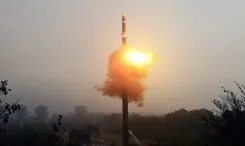Should the Five Eyes Alliance Collaborate to Combat Khalistani Extremism?

Synopsis
Key Takeaways
- Five Eyes alliance is urged to unite against Khalistani extremism.
- Canada’s recognition of Khalistani extremism marks a pivotal diplomatic breakthrough.
- Coordinated monitoring and intelligence sharing are essential steps.
- Khalistani groups have been officially labeled as extremists in Canada.
- This issue poses a global security threat that requires collective action.
Canberra, Sep 15 (NationPress) Australia, the UK, New Zealand, and the US need to collaborate with Canada to dismantle global fundraising and propaganda networks associated with Khalistani extremism, according to a recent report.
The report outlines critical measures such as coordinated monitoring of questionable non-profit activities, sharing of intelligence, and a clear political distancing from separatist groups, as highlighted by The Australia Today.
Traditionally viewed as an “Indian issue”, the report emphasizes that Khalistani extremism is now recognized as a global security threat due to Canada’s recent acknowledgment.
“If the Five Eyes democracies genuinely aim to protect pluralism and their diverse communities, united action is essential. With its expanding Indian diaspora and solidifying ties with New Delhi, Australia is ideally positioned to spearhead this initiative. Canada has taken a bold step; now it’s time for its allies, including Australia, to stand resolute,” stated Amit Sarwal, co-founder of The Australia Today.
The report also indicated that Canada officially recognized that banned extremist organizations like Babbar Khalsa International and the International Sikh Youth Federation are involved in promoting separatism and violence.
“Canada has acknowledged what India has long warned about: the existence and activities of Khalistani extremist groups on its territory. The 2025 Assessment of Money Laundering and Terrorist Financing Risks distinctly labels these groups as national security threats, representing a significant shift in Ottawa’s counterterrorism approach,” he elaborated.
The 2025 assessment cautions that while these operations primarily target India, their activities could severely affect Canadian national security and foreign policy.
Sarwal noted that this development builds on the 2024 annual report from the Canadian Security Intelligence Service (CSIS), which was presented to Parliament shortly after important discussions between Prime Minister Narendra Modi and Canadian Prime Minister Mark Carney at the G7 Summit in Alberta in June 2025.
The 2024 report claimed, “Khalistani extremists based in Canada continue to pose a national security risk to Canada and its interests.”
For the first time, the report characterized Khalistan supporters within Canada as “extremists”.
India has long raised alarms about Canada providing refuge to such elements for decades, and this new acknowledgment signifies a diplomatic breakthrough.
“This is where Australia and other Five Eyes intelligence partners must step in. Canada has clearly drawn a line between free expression and violent extremism — the others must follow suit,” the report concluded.









